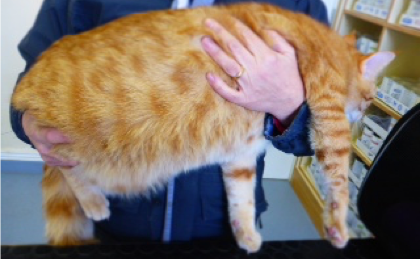
I’ve just spent the day in London: I had been asked to be a member of a panel discussing obesity in pets, as part of a debate at the AGM of the Pet Food Manufacturers Association. It may surprise some of the more cynical of you out there, but yes, the people who sell pet food are outraged at the high level of obesity in pets in the UK.
Overfed Pets
The PFMA carried out their first in-depth analysis of pet obesity in 2009, and they’ve just published their five-year review. Their aim is to support pet professionals and to encourage owners to stop over-feeding and under-exercising pets. As pet food manufacturers, they feel that they have a duty to help: I think they should be applauded for this proactive stance.
What does the new report say?
Sadly, there has been little improvement in the past five years.
- 77% of vets believe that the pet obesity problem has worsened in this period.
- Vets reckon that 40% of cats, 45% of dogs and 28% of rabbits are overweight
- Only 37% of pet owners believe that their pets are carrying too much body fat.
The truth may be hard to be specific about, but it’d be a good guess that around 4 out of 10 pets are being fed too much and/or not exercised enough. And they suffer as a consequence.
Effects of overfeeding
Obese humans live, on average, for nine years less than people of normal weight: for obese pets, the difference is two years. As well as the mechanical effect of extra stress on the joints aggravating arthritis, and extra pressure on the circulatory system making heart disease worse, there are serious metabolic effects: diabetes is far more common in overweight animals.
If the “animal suffering” argument fails to convince you, think about the financial cost. The PFMA reckon that around £215 million is wasted nationwide on costs linked to over-feeding pets.
Solving the problem
I was on the discussion panel today wearing my “vet in the media” hat; there were also vets with nutritional expertise, behavioural experts and vets representing charities and the pet retail industry. There was plenty of discussion from the floor too, and the good news is that we managed to reach a consensus: it was agreed that everyone needs to do more to work together to deal with this issue.
The key to this is owner education. 93% of owners say they would be concerned to discover that their pet was overweight, and that they would be willing to take action to deal with this.
What action should they take? Vets are ideally placed to offer advice on the correct body condition of pets, with 78% of British vets running obesity clinics. The PFMA has produced special pet Size-O-Meters to make it easy for owners to assess their own pets’ weight. Additionally, the PFMA is running a #GetPetsFit campaign, rolling out a pilot “fit camp for pets” initiative in the London area. Visit their Facebook page to find out more about this: perhaps similar initiatives may start elsewhere.
Other ideas were discussed: calorie counts on food labels, “obesity warnings” on pet food containers, a traffic-lights labelling system for treats, making dogs “work” for their food by hiding it, and other thoughts too.
The bottom line? Everyone who works with pets in the UK and Ireland is worried about the high levels of obesity, and we’re all determined to reverse this increasing trend. Watch this space!




Comments are closed.
Please note that I am unable to answer veterinary questions in comments. If you have questions or concerns about your pet's health it is always better to contact your vet.